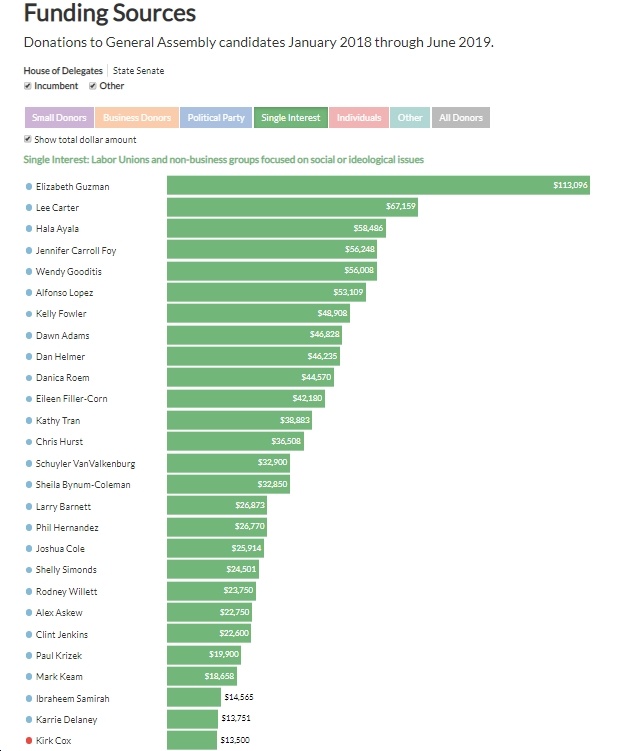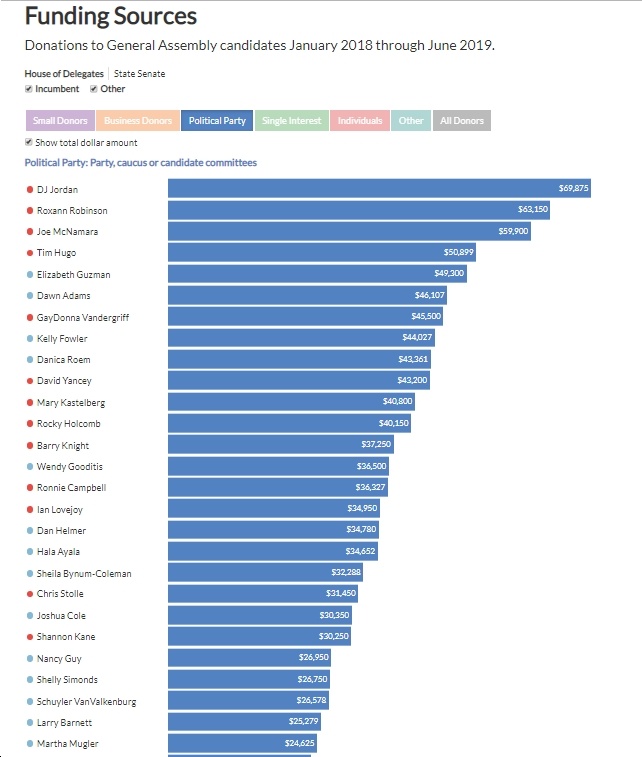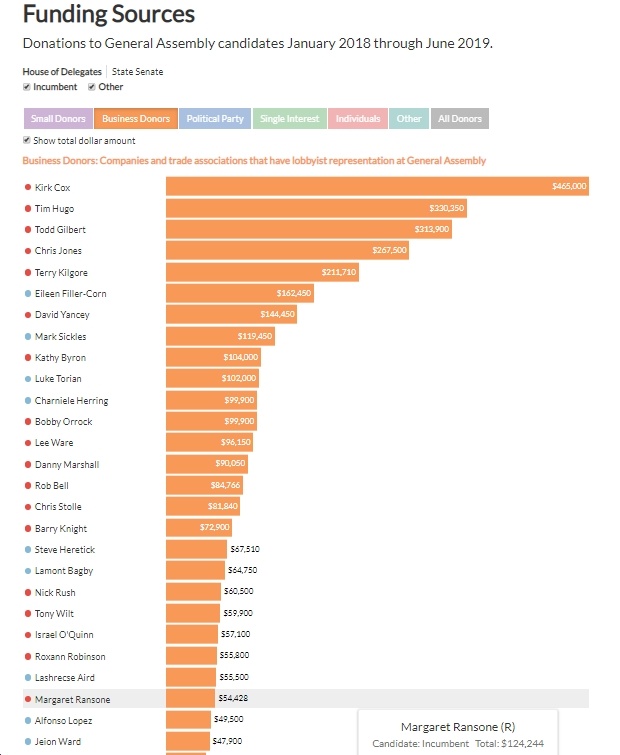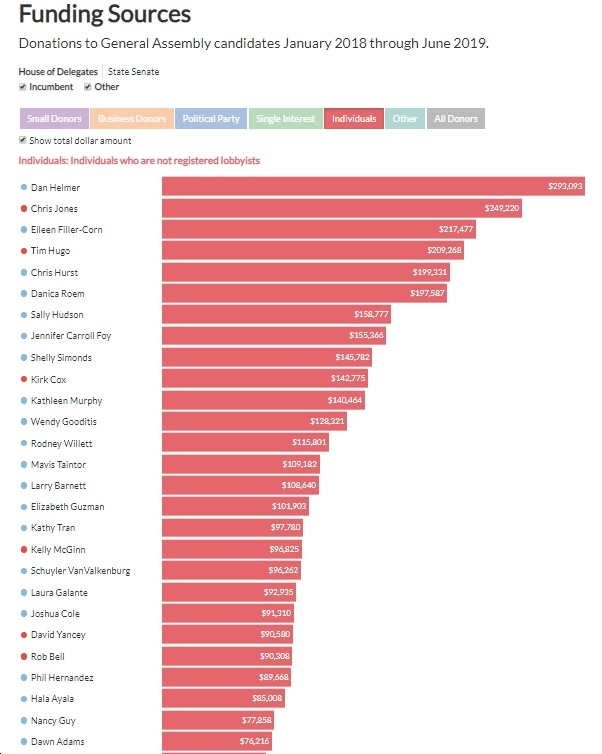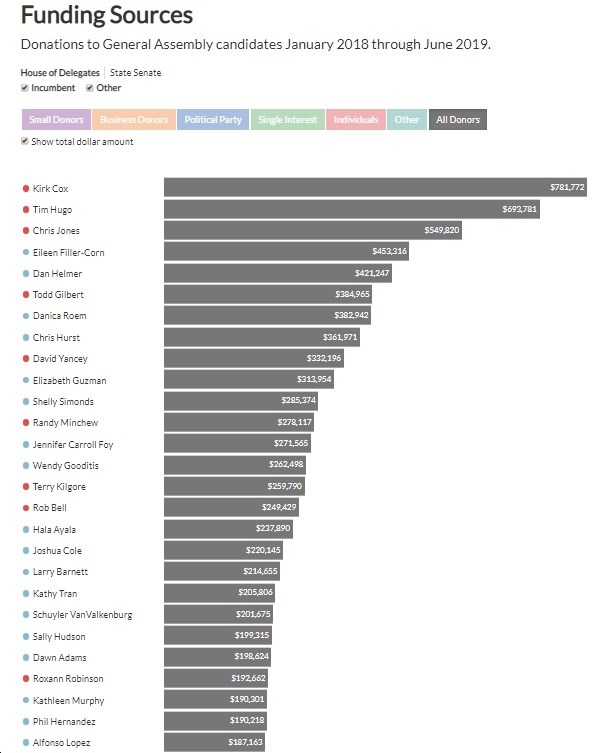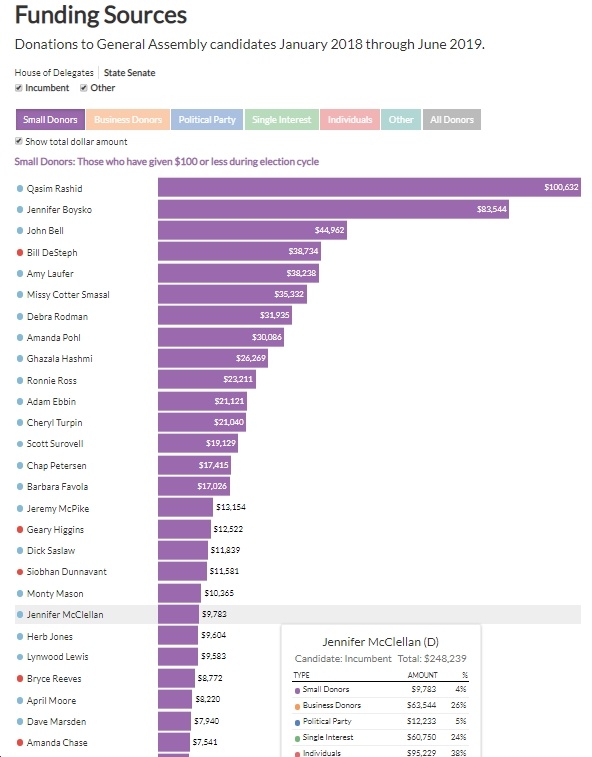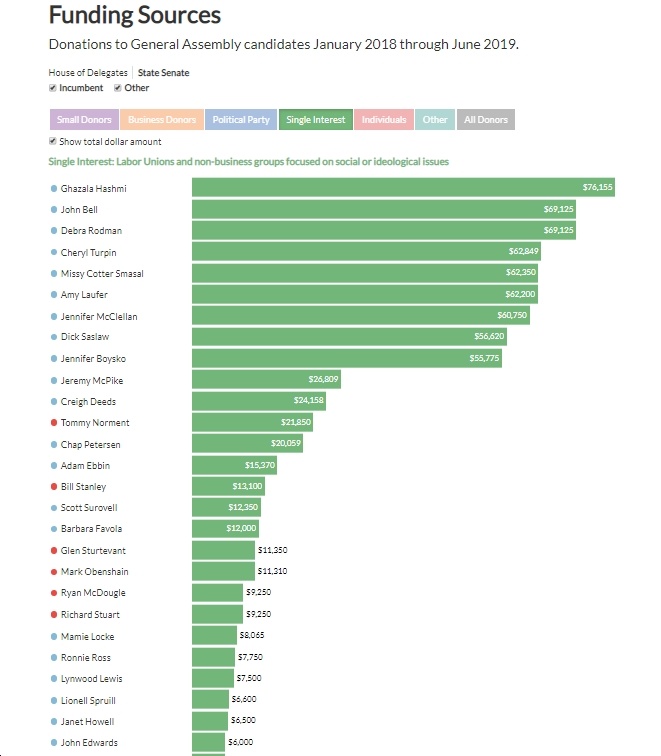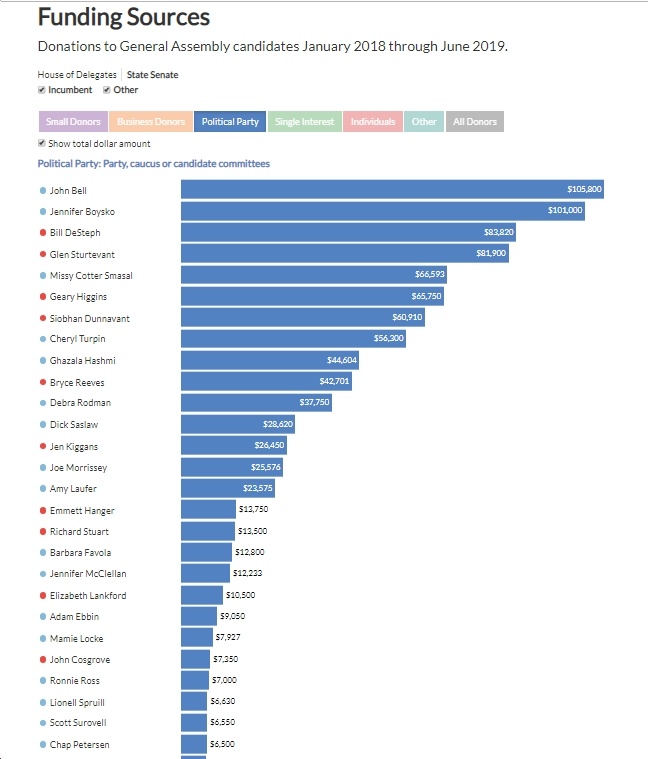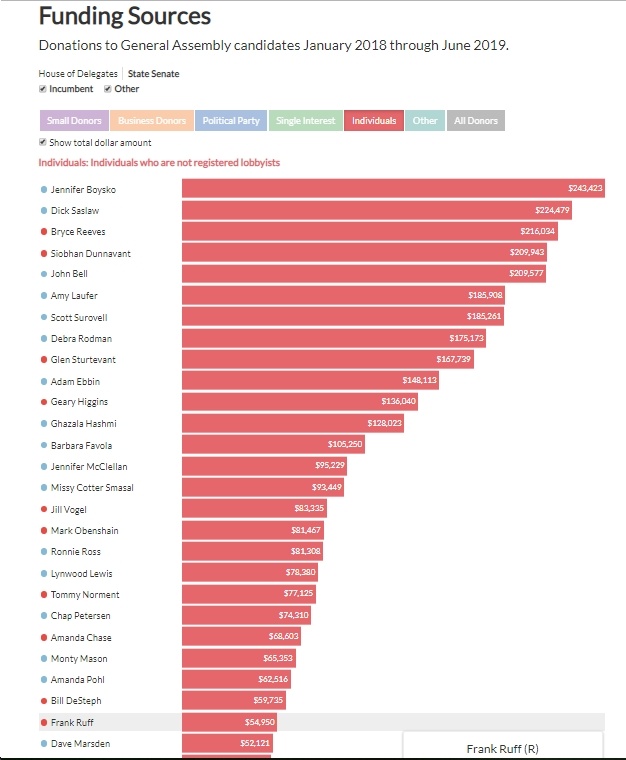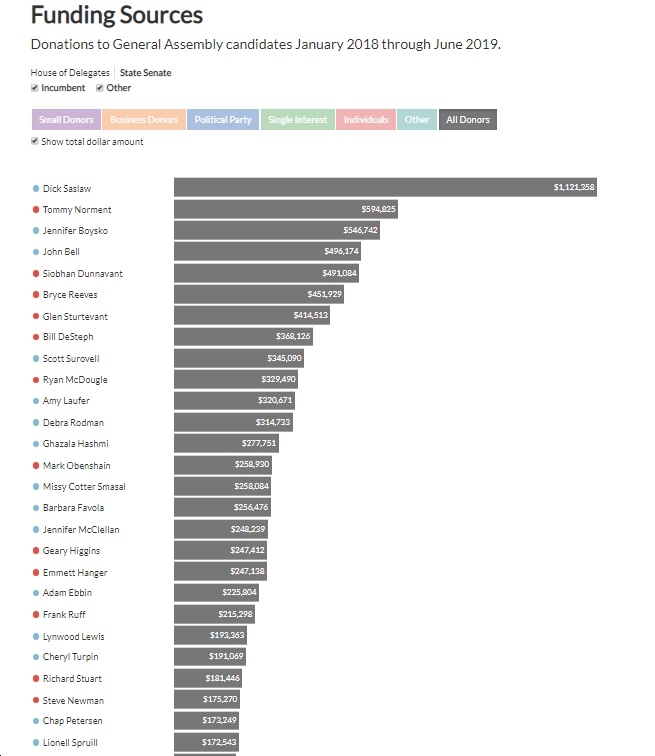See below for graphics, courtesy of VPAP, showing “Donations to General Assembly candidates January 2018 through June 2019.” I have a few comments on these numbers as well.
- When it comes to small-dollar donors, House of Delegates Democratic incumbents and candidates are dominating Republicans — the top 16 are all Democrats, as are the top 21 out of 23. Definitely seems like a pattern here.
- The top five House Democrats in terms of small-dollar donors are: 1) Del. Danica Roem ($97,424; also note that 25% of all her donations were from small donors); 2) Shelly Simonds (30% from small donors); 3) Joshua Cole (33% from small donors); 4) Phil Hernandez (30% from small donors); 5) Del. Chris Hurst (15% from small donors).
- The top-ranked Republican, Del. Tim Hugo, received $30,114 from small donors, but that accounted for just 4% of his total fundraising from January 2018 through June 2019.
- Almost all the donations to House of Delegates incumbents/candidates from labor unions/non-business groups went to Democrats, with the first Republican (Speaker Kirk Cox) not showing up until wayyyy down the list. That’s not particularly surprising, given how anti-labor Virginia Republicans are.
- Top Democrats in this category were: 1) Del. Elizabeth Guzman ($113k; 36% of her donations were from Labor Unions/non-business business groups focused on social or ideological issues); 2) Del. Lee Carter ($67k; 41% of his donations from this category); 3) Del. Hala Ayala ($58k; 25% of her donations); 4) Del. Jennifer Carroll Foy ($56k; 21% of her donations); 5) Del. Wendy Gooditis ($56k; 21% of her donations).
- Republican House of Delegates incumbents and candidates ranked high (11 of the top 16) in this category, although clearly both Democrats and Republicans receive money from their parties.
- The leading House Republican (DJ Jordan) and leading House Democrat (Del. Elizabeth Guzman) are facing off against each other in HD31, which is a 56%-43% Ralph Northam district.
- As for Delegates Tim Hugo (R-HD40) and Roxann Robinson (R-HD27), they are both highly endangered Republican incumbents, with Hugo facing off against Democrat Dan Helmer in a 55%-44% Ralph Northam district and Robinson against Democrat Larry Barnett in a 51%-48% Ralph Northam district. So clearly Republicans are trying to protect those two.
- Not surprisingly, corporate donors just loooove the party of crony capitalism and corporate welfare, as House Republicans account for 13 out of the top 17 ranked incumbents and candidates in this category.
- Also not surprisingly, the top recipients of corporate money were the top-ranked House Republicans: Speaker Kirk Cox, Majority Leader Todd Gilbert, Majority Caucus Chair Tim Hugo, House Appropriations Committee Chair Chris Jones and House Commerce and Labor Committee Chair Terry Kilgore. Do these Republicans ever say no to anything big business wants? I bet it’s rare.
- When it comes to individual donors, House Democrats account for 18 of the top 22. This is, in a way, the mirror image of the Republicans’ domination when it comes to big corporate money.
- Top House Democratic recipients of donations from individuals are: 1) Den Helmer ($293k; 70% of his money from individual donors); 2) House Democratic Leader Eileen Filler-Corn ($217k; 48% of her money from individuals); 3) Del. Chris Hurst ($199k; 55% of his money from individuals); 4) Del. Danica Roem ($198k; 52% of her money from individuals); 5) Sally Hudson ($159k; 80% of her money from individuals).
- Looking at ALL donations since January 2018, House Republicans lead House Democrats, although the latter have been gaining ground recently.
- Top House Democrats in this category since January 2018 are: 1) House Democratic Leader Eileen Filler-Corn ($453k); 2) Dan Helmer ($421k); 3) Del. Danica Roem ($383k); 4) Del. Chris Hurst ($362k); 5) Del. Elizabeth Guzman ($314k).
- Just as is the case with the House, over on the Senate side, Democrats dominate when it comes to small-dollar donors, with just one Republican ranked in the top 16.
- The top Senate Democrats when it comes to small-dollar donors are: 1) Qasim Rashid ($101k; 65% of his total money from small-dollar donors); 2) Sen. Jennifer Boysko ($84k; 15% from small-dollar donors); 3) Sen. John Bell ($45k; 9% from small-dollar donors); 4) Amy Laufer ($38k; 12% from small-dollar donors); 5) Missy Cotter Smasal ($35k; 14% from small-dollar donors).
- Also, just as is the case on the House side, Senate Dems dominate when it comes to donations from labor unions and non-business groups focused on social or ideological issues. Again, why would any organization that cares about working people ever donate to a Republican?
- Top Senate Democrats in this category are: 1) Ghazala Hashmi ($76k; 27% from this category); 2) Del. John Bell ($69k; 14% from this category); 3) Del. Debra Rodman ($69k; 22% from this category); 4) Del. Cheryl Turpin ($63k; 33% from this category); 5) Missy Cotter Smasal ($62k; 24% from this category).
- The political parties are, unsurprisingly, putting money into some of the most competitive State Senate races, such as SD13 (Democrat John Bell vs. Republican Geary Higgins), SD10 (Democrat Ghazala Hashmi vs. Republican Sen. Glen Sturtevant), SD12 (Democrat Debra Rodman vs. Republican Sen. Siobhan Dunnavant), SD7 (Democrat Cheryl Turpin vs. Republican Jen Kiggans).
- Similar to the House side, corporate donors have definitely favored Republican State Senate incumbents over Democrats not named “Dick Saslaw.”
- The top Republican in terms of corporate money is Senate Majority Leader Tommy Norment, who received $420k, accounting for 71% of his total donations from January 2018 through June 2019.
- Other top Republicans also received a huge chunk of their money from corporate sources — 71% for Sen. Ryan McDougle, 71% for Sen. Emmett Hanger, 92% for Sen. Steve Newman, etc. And, shockingly, they voted consistently in support of big business over working people and the environment.
- Senate Democrats dominated (11 out of the top 15) in donations from individuals.
- Top Senate Democratic incumbents and candidates in this category are: 1) Sen. Jennifer Boysko ($243k; 45% of her total money from individuals); 2) Sen. Dick Saslaw ($224k; 20% of his total money from individuals); 3) Del. John Bell ($210k; 42% of his total money from individuals); 4) Amy Laufer ($186k; 58% of his total money from individuals); 5) Sen. Scott Surovell ($185k; 54% of his total money from individuals).
- Looking at all money raised since January 2008 by Virginia State Senate incumbents and candidates, it looks like Democrats are more than holding their own with Republicans
- The top Democrats on the Senate side in terms of total money raised since January 2008 are: 1) Sen. Dick Saslaw ($1.1 million – nearly twice as much as Senate Majority Leader Tommy Norment); 2) Sen. Jennifer Boysko ($547k); 3) Del. John Bell ($496k); 4) Sen. Scott Surovell ($354k); 5) Amy Laufer ($321k).
- Four of the top five Republicans are in districts won by Ralph Northam in 2017 and/or Tim Kaine in 2018 – Sen. Siobhan Dunnavant (52% Northam/57% Kaine SD12); Sen. Bryce Reeves (50% Gillespie/52% Kaine SD17); Sen. Glen Sturtevant (57% Northam/61% Kaine SD10); (50% Northam/52% Kaine SD8). All of these are potential Democratic pickups in 2019, which of course means we need to help their Democratic challengers.




